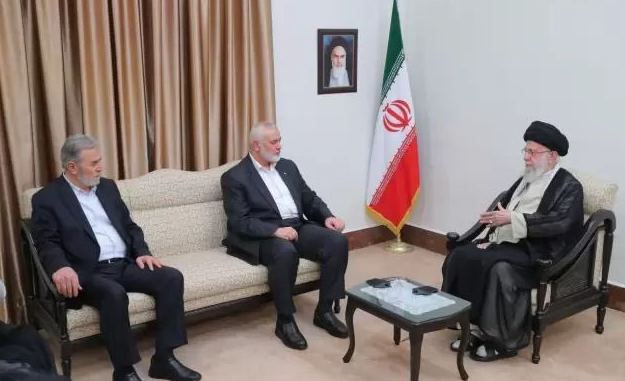Tehran — Senior Iranian officials, including Brigadier General Esmail Qaani, the leader of the IRGC Quds Force, have gathered for an emergency meeting of the Supreme National Security Council at the residence of Iran’s Supreme Leader. This high-level meeting is taking place under exceptional circumstances, reflecting the gravity of the situation.
Also Read: Top Hamas Leader Ismail Haniyeh Assassinated in Tehran
Analyst Insights: Israel’s Approach and Potential Conflict
Wajeeh Lion, a regional analyst, commented on the situation, noting that while Israel is actively targeting key figures in the Middle East, it prefers to strike at groups like Hamas and Hezbollah rather than engaging in direct conflict with Iran. Lion suggested that Israel’s strategy involves focusing on proxy groups to avoid a full-scale war with Iran.
Lion also highlighted the non-military nature of the recent assassination, suggesting it was an intelligence-based operation rather than a direct military action. He speculated that this might be why Israel has not openly claimed responsibility for the attack.
Ismail Haniyeh’s Statement on the Bloodshed
Ismail Haniyeh, a prominent Hamas leader, has previously stated that his family has paid a heavy price in the ongoing conflict. Since the escalation began with Hamas’s attacks on southern Israel in October, Haniyeh reported that 60 of his relatives have been killed. In April, Israeli airstrikes on the Shati refugee camp in Gaza resulted in the deaths of three of Haniyeh’s sons and at least two of his grandchildren. The Israeli military described these individuals as “Hamas operatives” involved in planning terrorist activities.
Haniyeh remarked, “All our people and all the families of Gaza have paid a heavy price in blood, and I am one of them.”
Mohammed Ali al-Houthi Condemns the Assassination
Mohammed Ali al-Houthi, head of Yemen’s Houthi Supreme Revolutionary Committee, condemned the targeting of Ismail Haniyeh as a “heinous terrorist crime” and a serious violation of international laws and values. His remarks underscore the broader regional condemnation of the assassination and its implications for ongoing conflicts.
Key Points:
- Emergency Meeting: Senior Iranian officials, including Brigadier General Esmail Qaani of the IRGC Quds Force, are convening an emergency meeting at the Supreme Leader’s residence in Tehran. This meeting reflects the seriousness of the current situation.
- Israel’s Strategy: Analyst Wajeeh Lion suggests that Israel prefers to target proxy groups like Hamas and Hezbollah rather than engage in direct conflict with Iran. The recent assassination is seen as part of this strategy to avoid a full-scale war.
- Nature of Assassination: The assassination of Hamas leader Ismail Haniyeh is described as an intelligence-based operation, which some analysts believe is why Israel has not claimed responsibility.
- Haniyeh’s Statement: Haniyeh has reported significant losses in his family due to the conflict, including the deaths of three sons and two grandchildren in April. He described the ongoing bloodshed as a heavy price paid by Gaza’s families.
- Regional Reactions: Mohammed Ali al-Houthi of Yemen condemned the assassination of Haniyeh as a “heinous terrorist crime” and a violation of international laws and values, highlighting the broader regional disapproval of the attack.



